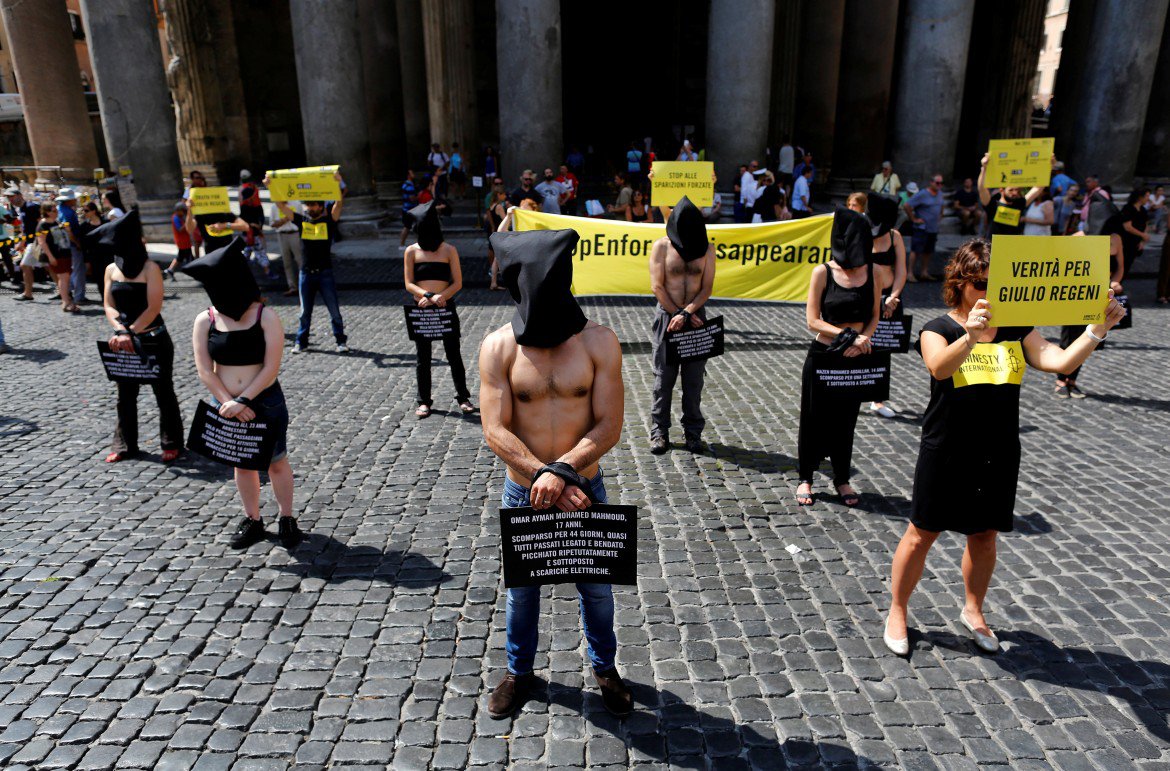Human rights
Egypt disappears about three people every day
A new Amnesty International report paints a strikingly routine picture of torture and enforced disappearances in Egypt.

Bare-chested, hands tied, a black hood pulled over their heads. Under the hot sun of Rome, in Piazza del Pantheon, the Amnesty International activists act out torture and enforced disappearances in Egypt. A flash mob organized Wednesday morning to commemorate Giulio Regeni and hundreds of other victims of these barbaric, yet routine, practices under the “friendly el-Sisi regime.”
On average, there are “three to four disappearances every day,” according to data collected by the local non-governmental organizations and compiled in a dramatic new report released by Amnesty entitled “Egypt: Officially, You Do Not Exist.’ Enforced disappearances and torture in the name of war against terrorism.” The document highlights “an unprecedented trail of enforced disappearances in the first months of 2015,” explains the association promoting the campaign “Truth for Giulio Regeni.”
Italian Foreign Minister Paolo Gentiloni knows well the status of human rights violations in Egypt, even though the government he is a part of is paralyzed, unable to act on the many promises of firmness, under the power of cross vetoes and private interests. Even that small decision to suspend the upcoming supply of spare parts for F-16 planes — used by the Cairo regime not only to fight Daesh but also to bomb Shia enemies of the Islamic State — Gentiloni had to provide explanations Wednesday, during the question time in the House.
“Italy is absolutely convinced of Egypt’s key role both for the stability of the region and for the fight against terrorism and has never questioned the importance of cooperation,” is the answer given by the Foreign Minister to Ignazio La Russa. However, the “firmness” in the “demand for clarity and cooperation” in the Regeni case is a must, Gentiloni added: “We owe it not only to the family, but it is a matter of national dignity.”
Moreover, as Amnesty writes in its report, which includes 17 detailed testimonies of some of the hundreds of Egyptian victims, including 14-year-old boys, “the signs of torture on the body” of Regeni are “similar” with “those on the Egyptians dead in state custody. This suggests that the death of the Italian researcher was just the tip of the iceberg and that may be part of a wider series of enforced disappearances carried out by the National Security Agency (NSA) and other intelligence services all over the country.”
Protesters, dissidents and “anyone who dares to speak is at risk,” said Philip Luther, Director of Amnesty’s Program for the Middle East and North Africa. “The fight against terrorism is used as a justification for abducting, interrogating and torturing those who intend to defy the authorities.” Luther also denounces “the collusion between the security forces and judicial authorities, whose role is to lie to cover up the actions of the security services or not to investigate allegations of torture.” Some details in the report are chilling; who knows if His Honor La Russa read them. Like the section about Mazen Mohamed Abdallah, “subjected to enforced disappearance in September 2015, when he was 14, was repeatedly raped with a wooden stick to extract a false ‘confession.’”
Or as in the case of Asher Mohamed, who was also 14 years old, “the victim of enforced disappearance in January 2016 for 34 days, during which he was beaten, hit with electric shocks all over his body and suspended by his limbs in the NSA offices. … Eventually, he was brought before a prosecutor who threatened him with further electrocution when he tried to retract the ‘confession.’”
Amnesty says that “the apparent increase in enforced disappearances dates back to March 2015, that his since the appointment of Magdy Abdel Ghaffar as minister of the interior, who had previously been part of the State Security Investigations Service (SSI), the notorious secret police of Mubarak’s time, responsible for serious violations of human rights. It was dismantled after the 2011 revolt, only to be renamed NSA.”
The organization therefore calls upon all the E.U. countries and the U.S. to “cancel all transfers of arms and other material used to commit serious human rights violations” perpetrated “under the false pretext of security and the fight against terrorism.”
The same pretext opposed by the representative of the Egyptian Parliament, Mohamed al Orabi, who traveled to Rome on Monday to take part in the Parliamentary Assembly of the Union for the Mediterranean, which ended Thursday. Al Orabi acted as the speaker of parliament Ali Abdel Al who resigned after the decision of the Italian Senate to block the spare parts for the F-16 fighter planes. Italy has “based its position on wrong assumptions,” al Orabi said, reiterating that Egypt has always shared all information on the Regeni case and will continue to do so.
Someone should have the courage to say to the Egyptian authorities that to secure justice for Regeni, it’s no longer enough to find the killers. Respect for human rights must be restored.
Originally published at http://ilmanifesto.info/egitto-regeni-e-altri-tre-al-giorno/ on 2016-07-14
